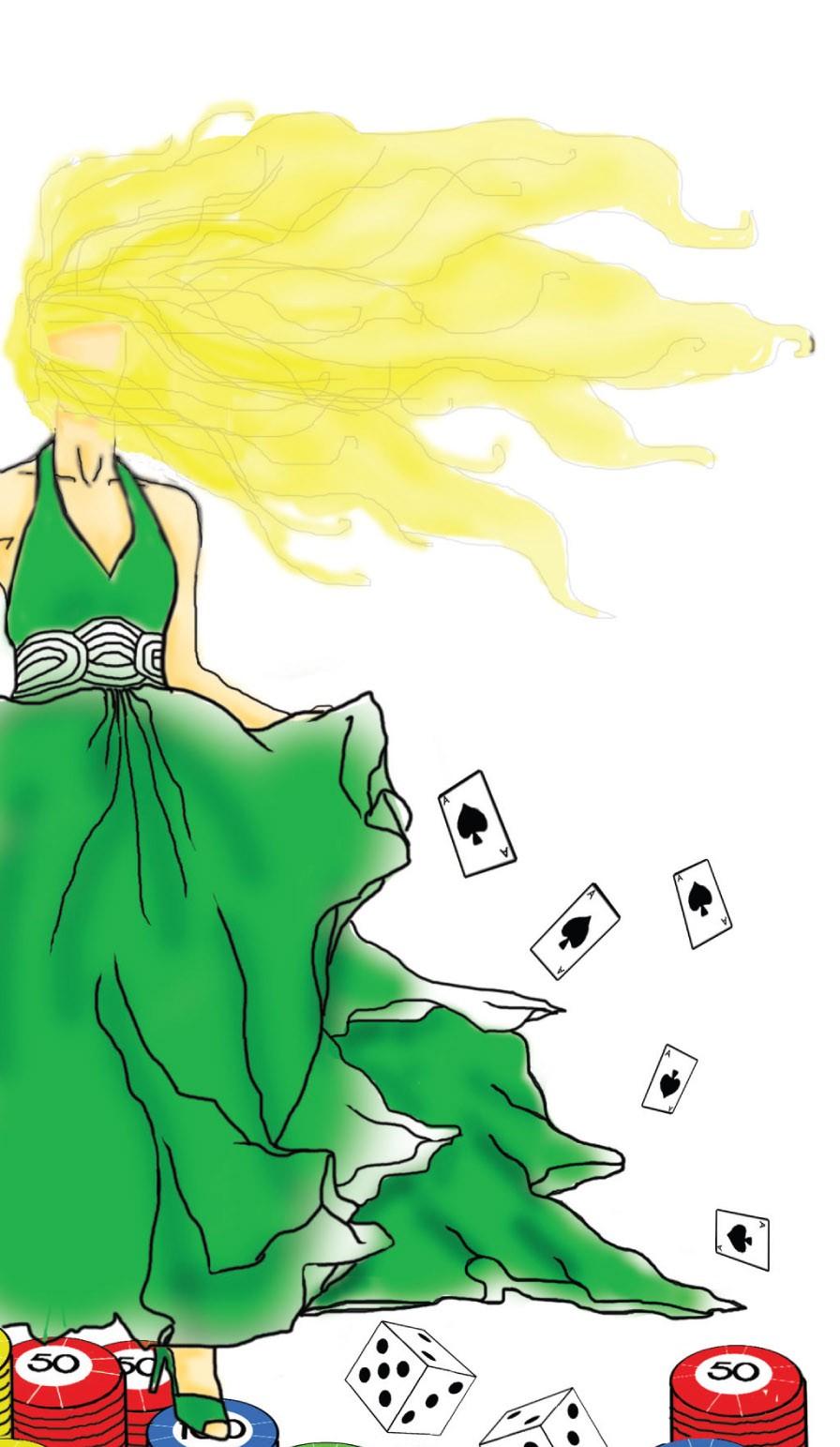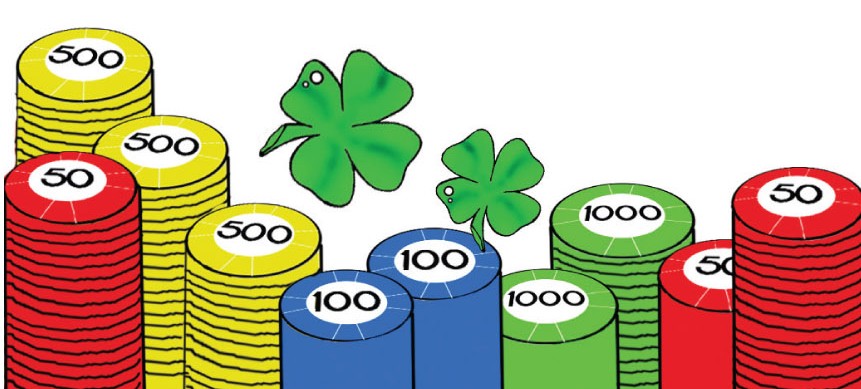They Call Her Lady Luck
In April, The ROCK staff looked at the role of luck in student life and student activities.
Cultural evil eye leaves lasting jinxes
Almost every language has a word for it. In Persian it’s “chashm zakhm”; in Spanish it’s “mal de ojo”; in Greek it’s “to mati.” In Arab nations, it’s known as the “ayn al-hasud,” and in Hawaii it’s called the “maka pilau.”
It translates to the evil eye, rotten eye, stink eye, bad eye, hot eye, eye of envy or even, in Portuguese, (olho gordo) the fat eye. Somehow, a single superstition has traveled into every corner of the world, crossing over cultural, religious and language boundaries.

“I do believe in the evil eye, and, in fact, I’ve had several experiences with the evil eye,” Dolatshahi said. “There was this time that I was going to go on a trip for my whole summer vacation, and this news spread around school. So when I went to the trip after only one week, I got chicken pox, although I had the vaccine for it already. It is very unusual, and I felt bad the whole trip. I believe that this happened to me because of the evil eye. We believe that the evil eye can ruin your life.”
But as Dolatshahi and many others worldwide believe, there are a few cures. One popular method of preventing the evil eye is wearing a necklace with a blue and white eye in the center. This belief comes from the Aegean Region where light eyed people were very uncommon and usually visitors from other lands.
These newcomers didn’t understand the custom of not gawking at someone or giving them comments on their beauty and would unintentionally curse the person they just complimented.
Many knock on wood, spit to get rid of the spirits in the area, perform rituals or get blessed by an older family member. Dolatshahi partakes in some of these methods.
“I do believe in that wearing a necklace with a white eye is helpful to keep the devil and curses away. Also, knocking on wood is a very popular thing in my country, and I do it here too,” Dolatshahi said. “I believe that luck does not define your future but can have a part in it.”
But the evil eye is not Dolatshahi’s main belief. She is Muslim, but she feels such superstitions are culturally important and widely held. Humanities teacher James Meyer said more often than not, superstitions are not gotten rid of when a major religion comes to a nation, but rather, a mixture of the two emerges.
“It’s a tricky game, and it’s very much a part of this dynamic syncretism, in which it seems as throughout history. People have been introduced to new spiritual ideas that they either found compelling or were compelled to follow that there has always been room for flexibility,” Meyer said. “In which, we don’t abandon one tradition to adopt another, but we do some compromising and some melding of traditions. I think the people who have been exposed to convincing explanations to why the world is the way it is hang on to those very tightly.”
Junior Inas Syed, like Dolatshahi, is a practicing Muslim, but she strongly disagrees with the idea of luck. She believes that as religion becomes a more crucial role in one’s life, previous superstitions become unimportant.
“In my religion, we believe that your life is already laid out by God, so there is no such thing as luck shaping your fate or future,” Syed said. “My grandmother and the older generation definitely believe in the evil eye. The belief is really cultural. There are some accounts of our prophet and the black magic, but it’s not as big as the older generation makes it out to be.”
Syed’s grandmother was “superstitious,” she said. She believed one should never tie shoes while upside down, cut one’s fingernails while it is dark outside, step on books or look down into the water at night. But she doesn’t believe many of these things. She thinks widespread education in the United States makes the country less superstitious.
“From my experience, the U.S. is less superstitious than the rest of the world,” Dolatshahi said. “They do not believe in certain things. For example, we believe in that seeing a black cat on your way to somewhere means that you won’t be lucky for the day, but no one believes that here.”
Meyer said this change of beliefs for newcomers is unique because there are few historical precedents. But the lack of superstition in America isn’t a lucky coincidence, he said, it’s a unifying standard for U.S. citizens.
“Part of the understanding of the American experiment is that we compartmentalize anything like an ethnic or cultural source, so we can come together and be kind of equal participants in the American project,” Meyer said. “So it’s almost as if for one of the first times historically that people have been asked, at least in part, to leave their old cultural assumptions behind and join into this new optional, shared, cultural assumption, which is the American experience – the American dream.”
By Maria Kalaitzandonakes
Hard work trumps good luck

And then, it happened. Eight minutes into the second half, the Bruins were coming off of a corner kick, and in an attempt to block the ball from getting near senior Eli Sherman, two Jays simultaneously leapt in the air to head it away.
“Because of the guys in front of me knocking each other out of the way, I wasn’t quite expecting to get the ball, so the header was mostly reflexes. So I didn’t get much force behind it,” Sherman said. “The ball moved pretty darn slowly towards the far post – it was actually kind of funny how slow it was going – and somehow it hit a seam where no one was at, and no one could get to it. And it bounced just inside the far post for a goal. So it was a pretty lucky goal.”
The scoreboard now read 1-0, and it stayed that way for the rest of the game. The Bruins were sectional champions. While the RBHS boys soccer team was top-ranked in Missouri last season, the win was, uncharacteristic for the team, based on a “lucky” shot.
However, according to RBHS goalie junior Greg Kelly, who was named the National Soccer Coaches Association of America player of the week back in September, soccer game flukes don’t normally decide the outcome of a game in sports.
“Practice makes perfect,” Kelly said. “You can’t just fluke a soccer game and win it off of some lucky goal. That happens, but usually, the better team wins; whoever practices more wins.”
As a goalie, Kelly works at every game to make seemingly “lucky” saves to the untrained eye. But before stepping out on the green for competition, hours of practice go into perfecting the saves.
Starting in the summer, RBHS head soccer coach Alex Nichols holds goalie camps, which Kelly attends, along with workouts and training during playing seasons, which allow him and other goalies to build the skills and instincts needed to make saves.
“Most of the time if we save [a goal], it’s skill. Because you can’t guess whenever they’re shooting when it’s not a penalty kick – you can’t just guess because you’ll look stupid and go the wrong way,” Kelly said. “[Coach] Nichols would make me run five miles for doing something stupid like that. You can’t guess at all. It’s just instinct. It just happens in the moment and you react.”
Advanced Placement Statistics and Algebra II teacher Amanda Dablemont, who also coached the girls basketball team for several years, including taking them to the final four and winning the state championship in 2008, understands the power of a lucky moment.
In one of the games that season, one of her girls made a half-court shot, and “from there it was like, ‘We’re good to go,’” Dablemont said. “We can’t lose. It was crazy.’”
However, for Dablemont, luck plays a miniscule part in her belief system. Starting in elementary school, she has been involved in music and sports, playing piano, clarinet, bassoon and oboe, as well as basketball in college. From her experiences, she values hard work above everything else.
“I hate the term, ‘good luck,’ and I kidded with the [basketball] coaches last year [that] I would rather you say, ‘I hope you worked hard because it really isn’t about luck,’” Dablemont said. “I just don’t think it is. Both [music and athletics] take hours and hours and hours of practice, and when it comes down to it, if you gave it everything you had before your performance, you’re probably going to be OK … because you have worked so hard for so long to perform.”
Senior Ben Bergstrom has little experience in athletics, but he has devoted just as much energy in perfecting something else – the musical arts.
Bergstrom picked up the saxophone in 6th grade band and has since gone on to make it into the prestigious Missouri Music Educators Association’s All-State ensemble twice, in addition to this year’s second chair position for concert band.
“It’s hard to have something like [music] be completely comparable to sports where it’s two teams, but with something like state band, where so many people audition … no one’s going to win who wasn’t good enough to win,” Bergstrom said. “Maybe there are five people who are good enough to win, but depending on how they performed that day and how the judge interpreted it … there’s all sorts of different things that judges take different ways.”
Although Bergstrom understands sports and music are very different activities, he still believes hard work is one of the keys that opens the door to opportunities. Different from sports, however, is the subjective aspect of music – those who get a good rating or win a competition are all based on scores given by judges, tinged with a human aspect.
“I know that certain people I’ve heard … they think they seem to have advantages at auditions because they know their teacher’s going to be the judge,” Bergstrom said. “So, obviously, they know what their teacher likes to hear, and they’ve learned to play everything their teacher is listening for. So that sort of thing I think affects judging.”
Bergstorm, who also composes music and has won awards for his musical compositions, says luck plays an especially big part when it comes to judging.
“It’s a lot different than a sport. There [are] no winners and losers in music. We made there be winners and losers by having competition, whereas sports are innately a competition. Music is not. It’s hard to quantify in any sort of way who wins [in music],” Bergstorm said. “So in terms of a composition competition, it’s completely down to luck. The preference of the judges and depending on the situation, that makes it completely up to luck on whether you’re going to win the competition or not.”
However, no matter who wins or loses, gets in or doesn’t, it doesn’t matter if luck plays a part – what really matters, Dablemont said, is what athletes and musicians gain from their journey to the performance.
“If you have lived so that you are constantly practicing a skill, and you know what it takes to become good at that skill, it puts you above,” Dablemont said. “I definitely think athletes and musicians have a better understanding of hard work than people who don’t experience those things, because they’ve never had to work hard for something unless it’s school. I don’t know what else it’d be.”
By Daphne Yu
















































































